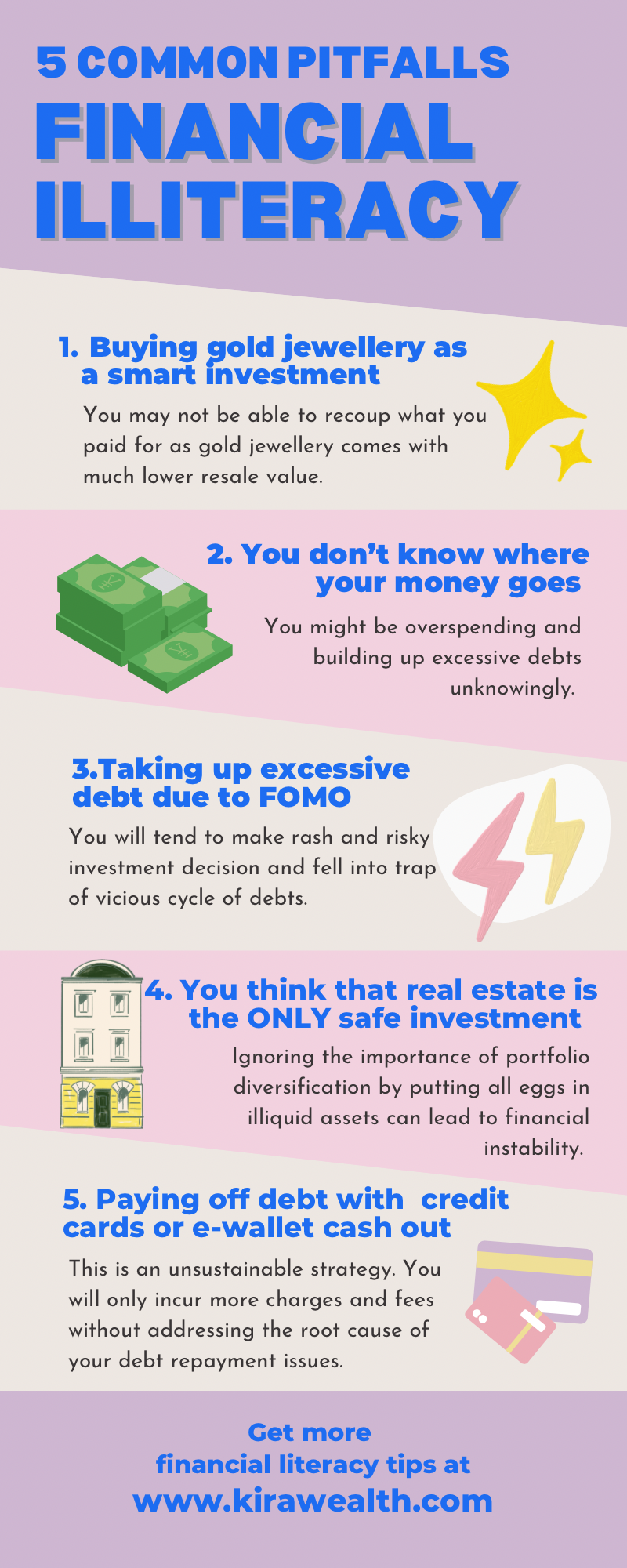Financial Literacy: 5 Common Pitfalls You Must Avoid for Financial Success
Many Malaysians are struggling with managing their finances. They often end up with no savings or even negative cash flow at the end of each month. In fact, the root cause of such financial stress is due to financial illiteracy. They don’t understand how to use money and how to manage their money. If you’re among them, don’t worry, you’re not alone. Here, we share tips on financial literacy: 5 common pitfalls that you must avoid for financial success and how you can fix them.

1. You believe that buying gold jewellery is a smart investment
Tips to fix
If you are really fond of the glittering gold, and want to add them in your portfolio, you can consider investing in gold ETF, goldsmith company, physical gold, and so on. Check out on UOB Malaysia. They offers a range of gold bullion products.
2. You don’t know where your money is going each month
You’re high earner, but you just don’t understand why you end up with 0 or higher credit card bills at the end of each month. Obviously, this is a sign of ignorance in personal finance. You may be overspending without realizing it. Even worse, you may be building up excessive debt unknowingly. Good news is that you can fix this and get back to the right track.
Tips to fix
You can start by looking through your bank and credit card statement, transaction history of your e-wallet. Start tracking your expenses, so that you can better understand your financial situation. Set your financial goals. Take control of your money and read on how to manage your finances.
3. You take on more debt than you can afford because FOMO
In today’s age of get-rich-quick-and-young and FOMO (fear of missing out), it’s easy to fall into the trap of taking on more loans than you can afford. People often do this in the hope of investing in opportunities that promise high returns. However, this approach can lead to financial instability and a vicious cycle of debt. Even worse, if you invest in illiquid assets such as real estates. By being financially literate and prudent, you can avoid the pitfalls of excessive debt and secure your financial freedom.
Tips to fix
It’s essential to assess your financial position and borrow only what you can afford to repay. This is where Debt Servicing Ratio (DSR) comes in. Use this financial calculation to determines your borrowing limits.
Debt Servicing Ratio (DSR) = Total Monthly Loan Payment / Net Income x 100%
Some financial institutions will still consider extending you the loan even your DSR exceeds 60%. However, it’s recommended that you avoid borrowing more than 40% of your DSR to maintain financial stability.
4. You think real estate is the only safe investment with guaranteed returns.
Real estate has long been viewed as a safe investment due to its potential to serve as an inflation hedge. However, relying solely on real estate for investment purposes is financially illiterate. It ignores the importance of diversifying your portfolio. Real estate is an illiquid asset, which can make it difficult to sell quickly and obtain needed cash. Additionally, there are no guaranteed returns from property investment. Worse still, the maintenance and upkeep costs for older properties can be high, potentially leading to a depressed selling price. It’s important to consider the risks and benefits of all investment options.
Tips to fix
Learn more on other investment options and diversify your portfolio. Read books, join online courses and attend investment forums. There are many different investment options such as stocks, bonds, mutual funds, REITs and exchange-traded funds (ETFs). You can also seek the help of a financial advisor to create a well-diversified portfolio.
5. You think paying off debts with credit cards is a smart financial strategy
Paying off your debts with credit cards can lead to an unending cycle of debt and high interest charges. Credit cards often charge high-interest rates and fees for cash advances or balance transfers. It might be a fraction of your total debt amount on monthly basis, but with time, these charges and fees may snowball into a significant amount. As a matter of fact, using a credit card to pay off another credit card does not address the root cause of the debt problem, which is overspending or a lack of financial discipline.
Tips to fix
Track your spending, focus on creating a budget and reducing expenses to free up cash flow. Look into alternatives such as a low-interest personal loan and debt consolidation. Seeking credit counseling services from agency such as AKPK to help manage debt will be a great way to overcome your debts problem too.
Are you sabotaging your future due to lack of financial literacy unknowingly?
We are constantly exposed to marketing ads, influencers, misleading financial advisor and tempting easy credit options. These only contribute more to the financial challenges we face, making it harder to discern reliable financial advice from the unreliable.
In today’s fast-paced world, financial literacy is a crucial life skill that everyone needs to have to thrive in life. However, many of us are unaware that we may not be as financial literate as we believe. By recognizing these five common pitfalls, we hope you can take the first step towards identifying financial illiteracy.
Stop sabotaging your financial future. Proactively addressing it you are getting closer to a more secure and prosperous financial future.


